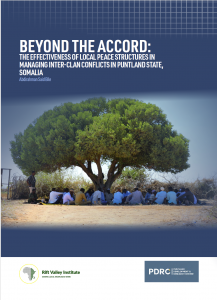THE EFFECTIVENESS OF LOCAL PEACE STRUCTURES IN MANAGING INTER-CLAN CONFLICTS IN PUNTLAND STATE, SOMALIA
EXECUTIVE SUMMARY
Clan conflicts in Somalia have a long history, dating back to the colonial era through to the period before the collapse of the government in 1991, up to the present day. For this reason, Somalis have developed rich experience in resolving interclan conflicts using traditional resolution mechanisms. This approach focuses on the containment of the conflict of the day rather than building and sustaining peace and/or preventing the re-escalation of conflicts. To prevent the recurrence of conflicts and keep peace, peacebuilding initiatives need to be influenced by a web of different actors, all the way from elite leadership to grassroots level. This study focuses on a Joint Peace Committee that was established in the Adadda area of the borders between Puntland, Somalia and Ethiopia to prevent the recurrence of a conflict and build the broken relationship between two disputing clans. The study employed a qualitative approach to collect and analyse data. Twelve Key Informant Interviews were conducted, and two Focus Group Discussions held (consisting of eight respondents each), in addition to the review of secondary literature on peacebuilding. The effectiveness of a local peace committee depends on its success to resolve the factors that have been hindering peace by addressing the structural causes of conflict and implementing any agreement reached, as well as by issuing early warning of escalation and activating early response, raising public awareness on peace, and building the relationship between the feuding communities. These factors prevent the recurrence of conflicts and help with the promotion of peace. To reach long-lasting solutions to interclan conflicts in Somalia, the study recommends the establishment of peace committees in conflict-prone zones, composed of diverse members of society from different levels of the community.
Acknowledgements
This paper has been published as a result of Abdirahman’s training in the Rift Valley Institute’s (RVI) Research Communities of Practice (RCoP) project. The paper therefore reflects the views of the author and not those or the position of the Rift Valley Institute. The RCoP is one of the RVI’s flagship projects that supports the professional development of early career scholars in east and central Africa through training, mentorship and dissemination of research outputs. Building on RVI’s long-term experience and presence in the region, the RCoP is a value-driven project that is built around a community of practitioners and academics with a common interest in the professional development of early career researchers. With funding from the Carnegie Corporation in New York, USA, and in partnership with the Open Society University Network-Hub for Connected Learning Initiatives, the RVI trained 27 early career scholars from Somalia, Somaliland, Ethiopia, the Democratic Republic of Congo (DRC), South Sudan and Kakuma refugee camp in Kenya in the first and second phases of the RCoP project between August 2022 and January 2024.
This report was edited by Catherine Rosemary Bond.
The Author
Abdirahman Said Bile is a researcher at Puntland Development and Research Center (PDRC). He earned Bachelor of Development Studies from Nkumba University and Master of Arts in International Relations and Diplomacy from Kampala international University, both in Uganda. Bile’s research interests are in Statebuilding and Peacebuilding in Somalia.




